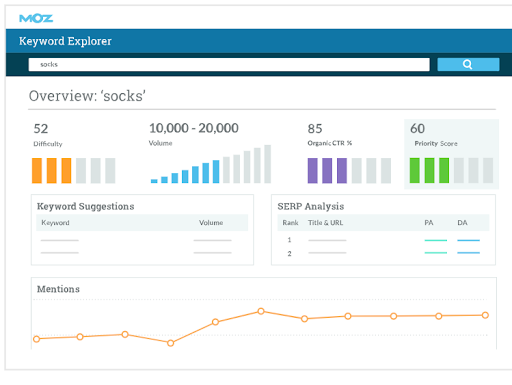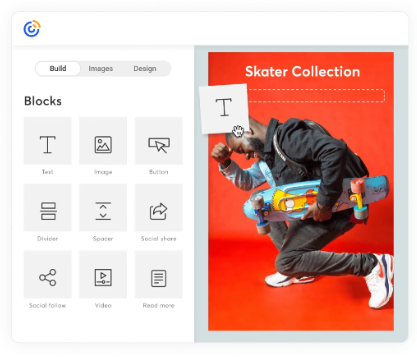
Picture this: you’ve got a stellar business idea and are eager to put it into action. However, you don’t have a staff (yet), and time is limited. How will you manage business operations while managing all your marketing channels? The answer: marketing tools designed for small businesses.
The best marketing tools for small businesses can save you time and money. They can streamline your marketing processes and help you manage customer relationships. There is a broad range of available marketing tools, including full-service digital marketing platforms, email, and social media management tools.
Read on to learn more about how to evaluate your current marketing processes to determine where the appropriate tools can fill the gaps.
List of marketing tools categories
What are tools in marketing? Marketing tools fall into six basic categories. Some assist with messaging strategy and content creation, while others help manage marketing campaigns or customer relationships. Whether you are on the cusp of starting a business or already running one, you can choose the best tools to support your organization.
CRM tools for small and medium businesses (SMBs)
Customer relationship management (CRM) tools strategically manage client relations. You can use them to input information about your customers, like their contact details, purchase history, demographics, and interests. Some CRMs track customer interactions, so you know where each customer is in the buying journey and the channels they communicate with you the most.
Project management and communication tools
Businesses that run multiple marketing campaigns at once or have a variety of products to sell — like e-commerce stores — can benefit from project management tools. With a project management tool, you can monitor your marketing campaigns simultaneously and track outcomes. Communication tools can help your teams stay on top of goals and interact with one another, even when working in different offices or remotely.
Social media management tools
If your brand uses social media platforms for marketing, social media marketing tools for small businesses can help monitor your accounts. You can use them to schedule posts in advance, track engagement, and integrate messages into one channel.
Email marketing tools
Email marketing tools are ideal for companies that use email for marketing purposes. They can help you manage your subscriber list, schedule and automate communications, and track campaign performance. Most tools include ready-made templates that are useful for designing emails.
Content creation and content marketing tools
These tools help you create materials to put in front of your audiences and draw them to your brand. They help create everything from social media posts to more long-form content and can be great if you need help brainstorming ideas.
SEO and analytics tools
If you rely on your business website to capture new customers (and most companies do), you want people to find it. Incorporating search engine optimization (SEO) practices helps search engines analyze and rank your website in search results. SEO and analytics tools can streamline your efforts and monitor client website engagement.
Top picks for marketing tools
You may be wondering: What tools do I need to start a small business?
There are a few must-have marketing tools that pretty much any organization can benefit from. Some are entirely free — like Google Analytics — while others require some initial investment. Remember that paid tools typically offer more features than free ones, so you’ll want to determine your business needs and compare options.
Here are some of the top online marketing tools for small businesses.
- HubSpot Marketing Hub: HubSpot Marketing Hub is an all-in-one CRM system that manages customer leads across email, landing pages, and forms. It’s also useful for marketing campaign management and includes automation features. Four different plans are available, including a free option for small businesses.
- Hootsuite: With Hootsuite, you can manage your social media marketing campaigns in one platform. It includes features to help design future posts using AI and Canva templates. You can schedule posts in advance and monitor client responses through a single inbox. Hootsuite offers a free 30-day trial for its paid plans.
- Canva: Canva is a design tool that makes it easy to create professional designs for social media posts, presentations, videos, and prints. It includes features for AI content generation and photo editing.
- Google Analytics: Any company with a website can benefit from Google Analytics, a tool that measures client visits and interactions. It’s free to use and offers customizable business insight reports.
SEO tools special focus
SEO tools enhance your organization’s online visibility in search engines, helping to attract more visitors to your website. Here are a few top products to consider.
- Semrush: Organizations looking for an SEO optimization tool may find Semrush helpful. It includes key SEO capabilities such as keyword optimization, backlink analysis, and technical site audits. You can also use it to track your search engine rankings.
- Ahrefs: Another renowned SEO tool is Ahrefs, which includes keyword and content idea recommendations. It can analyze competitor sites, uncover potential opportunities, and monitor your search engine rankings.
- Moz Pro: Companies seeking to drive targeted traffic to their website can benefit from Moz Pro, which identifies keywords clients are searching for. Moz Pro tracks keyword rankings, identifies website errors, and can help you find backlink opportunities.

- Yoast SEO: Yoast SEO is a straightforward SEO solution that includes essential tools to help you optimize your content for search engines and eliminate technical SEO mistakes. Plus, users can access support 24/7.
- Google Search Console: You can monitor site performance and receive instant notifications of unusual events through Google Search Console. It’s great for technical SEO and will let you know if search engines encounter difficulties crawling or indexing your site.
Email marketing special focus
Email marketing tools for small businesses help manage subscriber lists, create automated email funnels, and monitor client engagement.
- Constant Contact: With Constant Contact, you can streamline all your email marketing processes, from attracting subscribers to tracking campaign results. It includes customizable templates and marketing automation tools for small businesses so your message arrives at the right time. You can also add features like social media, SMS marketing, and CRM tools.

- Brevo: Businesses seeking a straightforward solution to create marketing emails and build their subscriber list may find Brevo a solid option. It includes pre-designed templates and segmentation features. Plus, its free plan allows you to send 300 emails per day.
- ActiveCampaign: ActiveCampaign helps organizations optimize and automate their sales funnel. It includes over 900 integrations to marketing tools and is ideal for cross-channel marketing activities.
- GetResponse: With GetResponse, you can organically grow an email subscriber list and promote your products based on customer interests and prior purchases. GetResponse is ideal for e-commerce businesses seeking to increase sales and revenue.
- Campaign Monitor: Campaign Monitor makes it easy to design and create emails that subscribers want to read. It optimizes all emails for mobile devices, and AI content generation tools expedite the writing process. Campaign Monitor also includes an automation platform that helps map your customer journey.
CRM tools for enhancing customer relationships
When you have many clients, it’s easy to lose track of where they are in the buying journey. CRMs help you stay on top of customer relationships. A CRM can monitor each client interaction with your organization so you can determine which marketing resources to use when closing a sale. Plus, it’s great for tracking customer contact details and interests.
Here are some of the best CRM digital marketing tools for small businesses.
- Salesforce: Salesforce ranks among the top CRMs for global organizations. It connects all your marketing, sales, and service processes in one app, eliminating the need for multiple products. Customers can customize their Salesforce experience using the company’s apps.
- Zoho CRM: Businesses searching for a streamlined, sensibly-priced solution may find Zoho CRM suits their needs. It’s perfect for automating workflows and marketing campaigns and includes an extensive analytic platform to help businesses make informed decisions. Users can customize Zoho CRM to meet their needs with no coding required.
- HubSpot CRM: HubSpot’s CRM is entirely free, which makes it ideal for budget-minded small business owners. It includes all the features you’d expect in a CRM, including sales pipeline management, a meeting scheduler, and comprehensive analytics tools. Customers can upgrade to the enterprise CRM for additional premium features.
- Pipedrive: With Pipedrive, you can automate lead nurturing activities, customize sales pipelines, and centralize all your customer data. It includes many options to tailor the CRM to fit into your business operations, such as customizable reports and data input fields.
- Freshsales: Organizations seeking an inexpensive CRM solution may find Freshsales a welcome option. Freshsales maps out your entire sales process, helping to eliminate clutter and categorize new leads according to their stage in your customer journey.
Deciding between different marketing tools
With so many options available, it can be a challenge to determine which marketing tools are best for your business. You don’t want to overinvest and break your marketing budget, but you don’t want to miss out on sales simply because you don’t have the right strategies and software.
Balancing marketing skills, budget, and tool functionality
To make an informed decision, first identify your marketing needs. Where can tools help you connect with customers and share your marketing message? Are there any time-consuming tasks that can benefit from automation? What marketing channels are you currently using? Are you an experienced digital marketer, or is it new to you?
Let’s consider an example. Say you’ve been asking yourself, “How do I market my small business like a pro?” If you run an e-commerce store, email and social media are likely your primary marketing channels. In that case, you’d likely benefit from SEO tools to optimize your website’s content and a social media and email marketing tool to connect with customers. You could evaluate the options by price and features and select the ones that best fit your organization’s needs.
Understanding overlap and integration between different marketing tools
Some marketing tools offer overlapping features or integrate with tools you use frequently. Of course, you don’t want to pay for multiple tools that perform the same functions.
Make a point to carefully evaluate all the features of the marketing tools to eliminate any product overlaps. For instance, if your CRM contains all the email marketing features you need, purchasing separate email marketing software is probably unnecessary.
Marketing education and resources
To newbies, online marketing can seem overwhelming. After all, there’s a lot to learn — from optimizing your website to designing an effective customer funnel. Fortunately, there are lots of resources that can help you get up to speed and use the marketing tools available effectively.
You can consider signing up for a digital marketing course at your local community college or university or reading books written by experienced digital marketers.
You can also leverage free online tools to learn the ins and outs of online marketing.
Constant Contact offers several comprehensive articles that cover the essentials of online marketing:
- How to Market Your Small Business on a Shoestring Budget
- 17 Beginner-Friendly Marketing Strategies for Small Businesses
- How to Get the Best Marketing Advice for Small Businesses
Marketing tools for specific business operations
What is the most successful marketing tool for small businesses? Small businesses don’t have to rely entirely on social media and email marketing to attract customer attention. Other tactics, like Small Business Saturday, event marketing, and video content creation, can grow your client base.

Organizations with a physical or online storefront can use Small Business Saturday to draw in customers. It occurs every Saturday following Thanksgiving every year and encourages consumers to shop at their local retailer rather than big box stores. You can advertise special deals on Small Business Saturday, which may attract more sales and increase revenue.
Holding special events like webinars or participating in popups, expos, and other customer-facing activities can help you build an audience and establish credibility in your market. Similarly, video content creation can get your brand in front of your target audience.
Additional tools and emerging technologies
Technology is constantly evolving — and so are the tools you may use in your marketing toolkit.
Many small business owners are leveraging AI to do some of the work for them and aid with tasks like identifying topics to write about for SEO, generating content ideas, and more. AI and automation are two newer and rapidly evolving features that can substantially benefit your business, saving you time and optimizing growth opportunities. Consider looking for tools that include those features in their platforms.
Use small business marketing tools to optimize your marketing campaigns
Today’s tools make effective marketing accessible to everyone — not just big brands with huge advertising budgets. You can invest in a few platforms and reap the benefits of professional marketing materials, including emails, social media, your website, and beyond. Many free marketing tools for small businesses make it easy to try different options, develop your skills, and perfect your campaigns.
Stay on top of the latest trends that can add value to your organization as marketing evolves, and watch your audience and bottom line grow.




